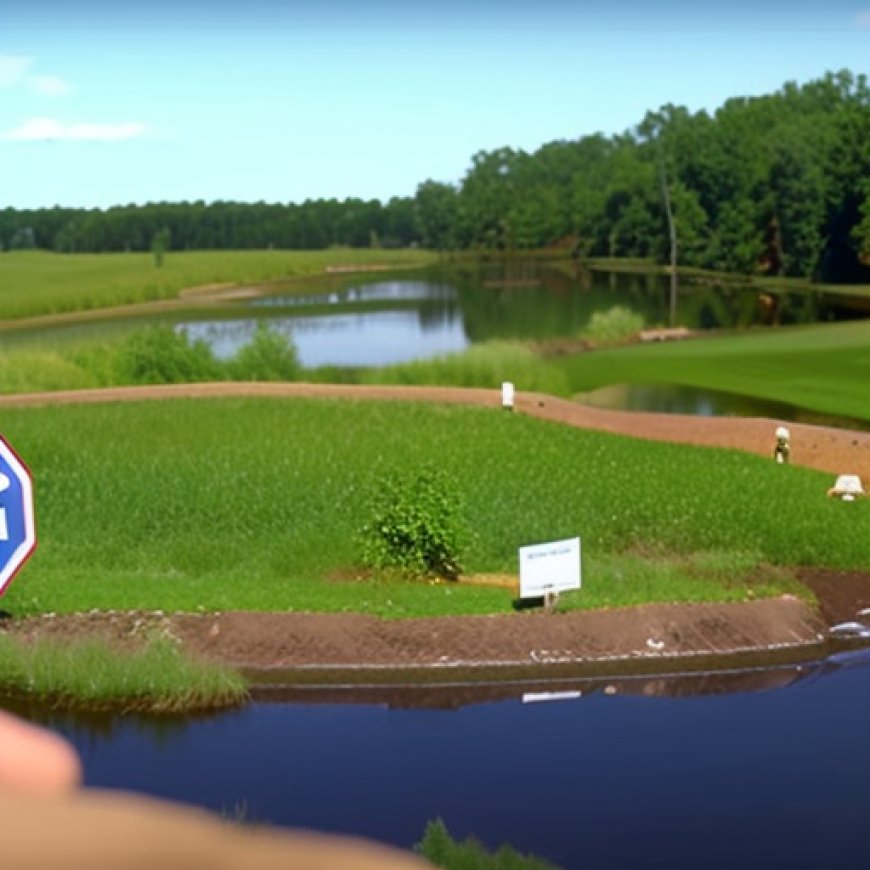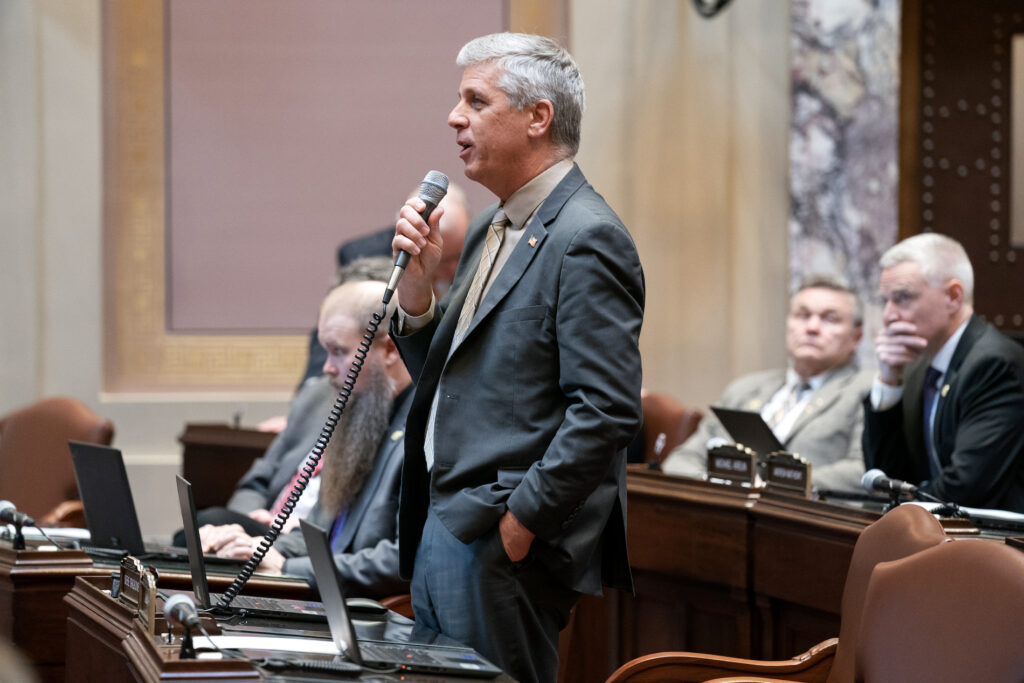Drazkowski proposes property tax credit for water quality certified farmland – Minnesota Senate Republicans
Drazkowski proposes property tax credit for water quality certified farmland – Minnesota Senate Republicans Minnesota Senate Republican Caucus


Minnesota State Senator Proposes Property Tax Credit to Protect Water Quality

Minnesota State Senator Steve Drazkowski (R-Mazeppa) is proposing a property tax credit to encourage farmers to implement conservation practices that protect water quality in southeastern Minnesota, where environmental groups and the federal Environmental Protection Agency have stoked fears about nitrate levels in groundwater.
Sustainable Development Goals (SDGs) Addressed:
- Goal 6: Clean Water and Sanitation
- Goal 13: Climate Action
- Goal 15: Life on Land
Senate File 4241 would provide a $5 per acre tax credit for agricultural and rural vacant land enrolled in the state’s Agricultural Water Quality Certification Program. It would apply in eight counties: Dodge, Fillmore, Goodhue, Houston, Mower, Olmsted, Wabasha, and Winona. The bipartisan bill received a hearing Thursday in the Senate Taxes Committee.
Sen. Drazkowski testified that the credit is a “small carrot” to incentivize farmer participation in a multi-phase solution after the Environmental Protection Agency pressured the state to do more about nitrates contaminating drinking water drawn from private wells in the Karst region.
“Farmers care deeply about the environment and have done a better job at protecting water than at any time in history,” Sen. Drazkowski said. “The state has developed an unreasonable set of requirements for Minnesota farmers based on fear-mongering by a group of environmental activists. That’s wrong. I think it is more important to reward farmers for doing the right thing. This bill signals to farmers that we trust what you are doing and we want to be partners in this process.”
Supporting Sustainable Development Goals:
- The tax credit incentivizes farmers to implement conservation practices, contributing to Goal 6: Clean Water and Sanitation.
- By addressing nitrate contamination, the bill supports Goal 13: Climate Action, as nitrates in drinking water contribute to greenhouse gas emissions.
- The protection of water quality aligns with Goal 15: Life on Land, as it helps preserve ecosystems and biodiversity.
The voluntary certification program, run by the Minnesota Department of Agriculture, guides farmers on implementing approved practices to prevent erosion and runoff over a 10-year period. The bill is supported by the Minnesota Corn Growers Association, Minnesota Farm Bureau, Minnesota Farmers Union, Minnesota Soybean Growers Association, Minnesota Cattlemen’s Association, and the Minnesota Pork Producers Association.
The bill was laid over for possible inclusion in a larger tax bill later this session.
Watch the Hearing:
- Downloadable link (Drazkowski bill begins at 1:47:58)
- Youtube link: https://youtu.be/7vqrZj-38Lc?t=6830
SDGs, Targets, and Indicators
| SDGs | Targets | Indicators |
|---|---|---|
| SDG 6: Clean Water and Sanitation | Target 6.3: Improve water quality by reducing pollution, eliminating dumping, and minimizing release of hazardous chemicals and materials | Indicator not mentioned in the article |
| SDG 13: Climate Action | Target 13.3: Improve education, awareness-raising, and human and institutional capacity on climate change mitigation, adaptation, impact reduction, and early warning | Indicator not mentioned in the article |
| SDG 15: Life on Land | Target 15.1: Ensure conservation, restoration, and sustainable use of terrestrial and inland freshwater ecosystems and their services | Indicator not mentioned in the article |
| SDG 17: Partnerships for the Goals | Target 17.16: Enhance the global partnership for sustainable development, complemented by multi-stakeholder partnerships that mobilize and share knowledge, expertise, technology, and financial resources | Indicator not mentioned in the article |
1. Which SDGs are addressed or connected to the issues highlighted in the article?
- SDG 6: Clean Water and Sanitation
- SDG 13: Climate Action
- SDG 15: Life on Land
- SDG 17: Partnerships for the Goals
The article discusses the issue of nitrate levels in groundwater and the need for conservation practices to protect water quality. This connects to SDG 6, which aims to ensure clean water and sanitation. The article also mentions the involvement of environmental groups and the federal Environmental Protection Agency, highlighting the importance of partnerships for sustainable development (SDG 17). Additionally, the article indirectly relates to SDG 13, as it addresses the impact of agricultural practices on the environment and the need for education and awareness on climate change mitigation.
2. What specific targets under those SDGs can be identified based on the article’s content?
- Target 6.3: Improve water quality by reducing pollution, eliminating dumping, and minimizing release of hazardous chemicals and materials
- Target 13.3: Improve education, awareness-raising, and human and institutional capacity on climate change mitigation, adaptation, impact reduction, and early warning
- Target 15.1: Ensure conservation, restoration, and sustainable use of terrestrial and inland freshwater ecosystems and their services
- Target 17.16: Enhance the global partnership for sustainable development, complemented by multi-stakeholder partnerships that mobilize and share knowledge, expertise, technology, and financial resources
Based on the article’s content, the specific targets identified are improving water quality by reducing pollution (Target 6.3), raising awareness on climate change mitigation (Target 13.3), ensuring conservation of terrestrial and freshwater ecosystems (Target 15.1), and enhancing partnerships for sustainable development (Target 17.16).
3. Are there any indicators mentioned or implied in the article that can be used to measure progress towards the identified targets?
No indicators are mentioned or implied in the article that can be used to measure progress towards the identified targets. The article primarily focuses on the proposed property tax credit and the involvement of various agricultural associations and organizations.
Behold! This splendid article springs forth from the wellspring of knowledge, shaped by a wondrous proprietary AI technology that delved into a vast ocean of data, illuminating the path towards the Sustainable Development Goals. Remember that all rights are reserved by SDG Investors LLC, empowering us to champion progress together.
Source: mnsenaterepublicans.com

Join us, as fellow seekers of change, on a transformative journey at https://sdgtalks.ai/welcome, where you can become a member and actively contribute to shaping a brighter future.







